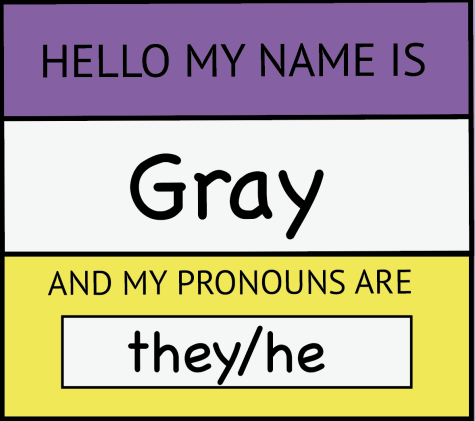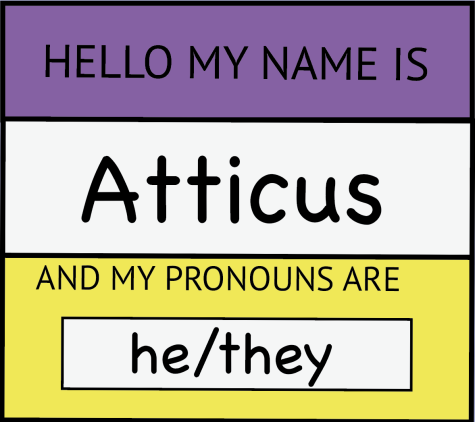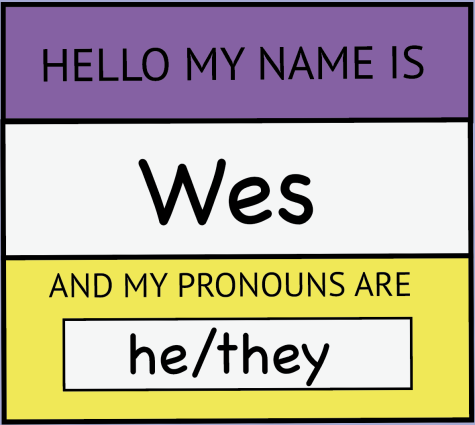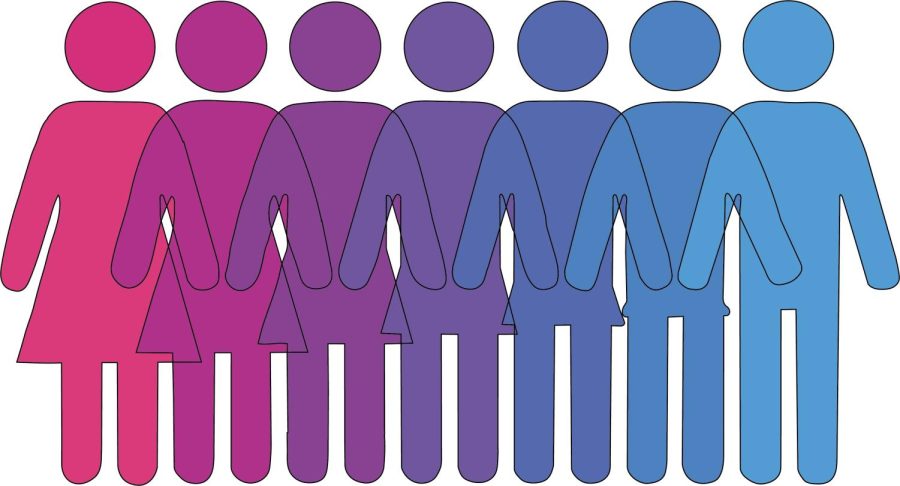Out of the Binary
Mar 29, 2022
Gender isn’t linear for everyone. As a non-binary person, I’ve experienced what it feels like being outside of the binary and not having my gender identity recognized. Whether it’s lacking gender-neutral bathrooms, teachers misgendering students, insufficient education on gender diversity in the curriculum, or parents not educating themselves on their children’s gender identity, teens who don’t fit into the gender binary often report feeling left out of the picture. This even occurs at Tamalpais High School, a school located in one of the most liberal counties in California with 82.3 percent of Marin County voters who voted for Joe Biden in the last presidential election according to the Marin Independent Journal.
The gender binary can be restrictive to many people. When a person is born, they are assigned a sex at birth (male, female, or sometimes intersex), but what many people don’t realize is that sex is different than gender. Gender is how a person identifies with a mix of social and cultural differences, rather than biological ones. According to the Merriam Webster dictionary, “a person whose gender identity corresponds with the sex the person had or was identified as having at birth” is cisgender, and “a person whose gender identity is opposite the sex the person had or was identified as having at birth” is transgender. Often people exist on the gender binary with men on one side and women on the other, but there are also many people who don’t fit within the boundaries of the binary, are in the middle, or tend to shift. According to the LGBT Foundation, a national charity that provides support and services to the LGBTQ+ community, “Non-binary people feel their gender identity cannot be defined within the margins of the gender binary. Instead, they understand their gender in a way that goes beyond simply identifying as either a man or woman.” More and more teens are continuing to challenge the gender binary. According to a 2020 survey of over 34,700 LGBTQ youth in the U.S conducted by the Trevor Project, “one in four ([26 percent]) LGBTQ youth identified as nonbinary. An additional [20 percent] said they are not sure or are questioning whether they identify as nonbinary.”
Each non-binary person at Tam has a different experience with gender. For some, changing pronouns, changing names, and clothing style are important for them, and for others, there is no desire to change anything at all. Some non-binary people experience signifigant gender dysphoria (discomfort in one’s sex), and some experience mild gender dysphoria. The non-binary community is diverse, and each genderqueer person navigates the world in unique ways.
As a nonbinary student at Tam, I have my own set of individual lived experiences that I have faced and continue to face. Still, my experiences are not in harmony with every nonbinary Tam student. To highlight the differences and similarities that gender-diverse students face within the Tam community, I have included three nonbinary students’ perspectives. Here are the experiences of some non-binary students at Tam.
Gray Westbrook (they/he)

For Tam senior and Gender and Sexuality Alliance club president Gray Westbrook, being non-binary has been more of a restriction. “You’re always going to have people who are going to perceive you as cis and your assigned gender so there’s always that ‘responsibility’ to correct people to get it right if you want to be comfortable while coexisting with other people,” Westbrook said. Westbrook describes their gender as fluid. “As long as people aren’t calling me she/her, it’s fine,” Westbrook said.
Coming to terms with their gender identity was a journey for Westbrook, but it was pretty gradual. Westbrook questioned his gender for a long time before sticking with they/he pronouns.
“I started to get uncomfortable with she/her and then it got to the point where I was like maybe I should try she/they so I tried to do that and then was like okay, I’m really uncomfortable with her so I decided to go they/them,” Westbrook said.
“For a while, I was good with that, but then I realized that I kinda love it when people perceive me as more masculine, so then I was like alright why don’t I add a little side dish of pronouns? So I did,” Westbrook said, then laughed. “I’ve done the full spectrum.”
Westbrook said many teachers often do not respect Westbrook’s gender identity regarding their pronouns and name change. A few have been able to figure out their name change and pronouns by paying attention to social cues without Westbrook having to go out of their way to correct them, which Westbrook appreciates.
“[One of my teachers] picked it up right away and I didn’t even have to tell him. Well, I told him my pronouns on the first day of class, but like he picked up on my name change really quickly just because I started changing it on the sheets of paper,” Westbrook said. “The teachers who make it a priority always get it right. But a lot of the time, people don’t make it a priority, and it’s very frustrating for trans students who need it to be a priority.”
Westbrook doesn’t think Tam teaches enough about trans identities. “It sucks because I have to explain [my gender identity] to people and that’s not something I signed up for. Like if you want to know so bad do your own fucking research,” Westbrook said.
“I wish the school would [educate themselves and students about trans identities] because it sounds like such an asshole thing to be like ‘look it up yourself.’ So if they included it in mandatory education, then I feel like it would be more widely understood, even if it wasn’t accepted,” Westbrook said.
Westbrook doesn’t have much dysphoria regarding the bathrooms at Tam because their dysphoria is more of a mental thing than a physical thing for him. “I don’t follow gender super strictly. I don’t get the same gender dysphoria that other trans youth might get… I just don’t like being called feminine things,” Westbrook said. “It’s easier for me… like I’m comfortable using the women’s restroom.”
Westbrook does believe there’s a major issue with the lack of access to gender-neutral bathrooms and hears about it through friends all the time. “It’s such a big deal among the genderqueer group. It spreads like breaking news. Like ‘gender-neutral bathrooms are closed today.’ They’re always closed,” Westbrook said. In the fall of last year, Tam added new gender-neutral bathrooms to Wood Hall, but most of them require a key to use. Having to ask for a key to use the gender-neutral bathroom is both inconvenient and can be an uncomfortable experience for trans people who aren’t out.
In Westbrook’s home life, his parents do try to get his pronouns right, but have said that it’s hard on them, which Westbrook said hasn’t felt supportive to them. “My mom, every time I correct her, she’s always very sure to mention that, ‘Oh, it’s so hard’ like she’ll make it a very big deal when I correct her,” Westbrook said. Their mom has also said backhanded comments throughout Westbrook’s gender identity journey, they said, making the focus on her rather than on Westbrook finding themself.
Westbrook changed their name to Gray, which is pretty close to their deadname. A deadname is a transgender persons previous name or birth name that they used before changing names to a new one during transition. After changing their name, Westbrook’s mom thanked him for making it easy on her, which was very frustrating. “It [my name change] wasn’t for you. I hate it when she does it, and it’s not a big deal, but it still pisses me off,” Westbrook said.
The most gender euphoric (joy experienced through gender expression) thing for Westbrook is when people they don’t know assume he’s a boy. “When people at the grocery store would call me sir, or if people I haven’t introduced myself to get it right, then it’s the most validating thing for me,” Westbrook said.
Westbrook said they wish cisgender people could understand and recognize the privileges that they have and not make trans experiences about them. Westbrook said, “Cis people—it’s not about you. It’s about us being comfortable in our own skin because you guys have that luxury just because you’re the general population, but we have to exist and fight for our identity in our everyday lives.”
Atticus De La Huelga (he/they)

Tam freshman Atticus De La Huelga, who identifies as trans-masculine, a broad term for people assigned female at birth, but do not identify as female, and lean towards masculinity, feels that being outside of the binary has been a very freeing experience. “No one’s going to look at me weird for being a boy in a skirt or a girl in baggy clothes because I’m already ‘the trans kid.’ Not that people are rude about it, it’s just that people can’t be surprised when I dress outside of the stereotype boy/girl boxes because I’m already not a boy or girl, although I am still mostly a boy,” De La Huelga said. Like Westbrook, De La Huelga describes their gender as very fluid. Some days they only use she/they pronouns, and other days they feel almost fully like a “guy.” However, they don’t feel comfortable with the label genderfluid and really like the term trans-masc.
De La Huelgas’s experience of coming to terms with their gender wasn’t easy. “It was really hard. I had a lot of internal transphobia, which I didn’t actually come to terms with until a few months ago. Even when I was out, it was still a bit overbearing. I didn’t want to acknowledge the fact that I wasn’t a girl, but I also was so torn up all my life that I hadn’t been born a boy. I didn’t want people to look at me differently for being trans, but I also didn’t want people to keep treating me like a girl. It was a lot of push and pull, but I eventually decided that being out as trans and being happy in the future was better than never really being happy with myself at all,” De La Huelga said. They plan to meet with a gender therapist (a therapist who specializes in helping people who are trans or are questioning their gender identity) in May.
De La Huelgas’s experience with their gender at Tam has overall been good. “Tam is a really ‘progressive’ school and really puts in the effort to be accepting. Obviously, it could do better, but everything could be better, and compared to the rest of the country, it’s doing a spectacular job so far,” De La Huelga said. “I’m really lucky to be here. My teachers have been great and I’ve only had to correct them a few times. There have been a few shitty guys, but mostly the students are all right. I just try to avoid people who don’t respect me.”
De La Huelga said their experience with gender-neutral bathrooms at Tam hasn’t been the best. “[Gender neutral] bathrooms could use some work. I think there’s one in Woodhall, but I don’t have classes there, and the physics one is practically invisible. There should be one in every building on at least where the other bathrooms are. We should have three more at the bare minimum,” De La Huelga said.
Coming out to her friends was easy for De La Huelga, but coming out to their parents required a lot more effort. “My friends were very, very accepting, given that a few of them [are] trans and most [are] queer. I came out almost a year ago, and they’ve been great the entire time. Stuck with me through a few indecisive name changes too. My parents weren’t as easy,” De La Huelga said. “My mom tries to be really accepting, but still has a hard time with my pronouns after 11 months. I’m still really, really grateful for her though. She was amazing for the most part and it could have gone much much worse. I didn’t come out to my dad for a bit because I honestly had no clue how it would go. I didn’t think he would kick me out, but I doubted he would be as accepting as my mom, at least not right away,” De La Huelga said. “He had some trouble but has been really good overall. We don’t talk about it much, but he shows his support when it’s needed. He knows it’s not his place to judge.” De La Huelga stated that his dad was supportive when having a conversation about starting testosterone at some point. Although there have been some rough patches with their parents, De La Huelga said, “I’m just really grateful for them both.”
Like many gender-diverse people, De La Huelga deals with gender dysphoria. “Some days dysphoria feels like depression and body image got turned into Godzilla and King Kong-sized monsters that had a hoard of social anxiety, intrusive thoughts, and more body image mutant babies that scream whenever you walk past the women’s clothing aisle in Target,” De La Huelga said. But De La Huelga also has enjoyable and euphoric moments being trans-masc and enjoys when people are confused by his gender. “I think the most gender euphoric thing I feel is when people, normally cis guys, tie themselves in knots trying to figure out whether I’m AMAB [assigned female at birth] or AFAB [assigned male at birth]. It’s hilarious to watch and makes me feel really happy knowing they just can’t tell. I tell them if they actually ask, but most of the time they try to be super stealthy about it,” De La Huelga said.
Wes (he/they)

Tam sophomore Wes, who chooses to keep their last name anonymous for privacy reasons, uses he/they pronouns and wants to be perceived as male to cisgender people, but doesn’t feel fully male internally.
“I know I’m not male, but for cis and straight people, I’d want them to see me as male,” Wes said. “I know I’ll never appear as ‘Oh, that person is a male’ to a cis person, but I don’t know how I would describe it to them because I don’t think they’d be able to understand like my gender is a guy, but not like a guy.”
“I thought I was genderfluid and then I was like oh, no I’m actually just like a feminine masculine person. I went from she/her to he/they, but the they is kind of silent. I’m like he/him, but with he/they vibes.” Wes feels they will eventually physically transition some time in the future.
Being genderqueer has been difficult for Wes at home, even with gay dads, and he hasn’t had the support to feel comfortable coming out as genderqueer to his parents. Wes did come out early on as queer, which their dads supported, but their dads haven’t been very welcoming towards gender diverse people within the LGBTQ community. “I came up to my parents, and I was 11, and I was like, ‘I don’t feel like a girl or a boy,’ and they were like, ‘I don’t think you know what that means,’ so I ignored it for four years,” Wes said.
When strangers call Wes a guy, his dad often interjects and corrects them, not knowing Wes is trans. Wes said, “My dad will be like, ‘That’s actually my daughter.’”
Wes enjoys the moments when people perceive them as a guy and recalls specific moments that brought them joy. “One time, I went kayaking, and the instructor was like, ‘How are you doing today, young man?’ I was like, yeah, I’m a young man, but not a man, but you know, I’d rather you perceive me as that than the other option,” Wes said. Wes also enjoys playing with androgyny as a way to confuse people about their gender. “There have been times where I’m wearing a dress with a binder, and I’m like, haha, you don’t get to know my gender,” Wes said as he laughed.
Wes has had a few negative experiences with teachers at Tam respecting his pronouns, and they said that many teachers have had some dismissive responses that haven’t made him feel accepted when he comes out to them. “I told one of my teachers my new name, and they said, ‘Okay, [deadname].’ Like she literally said it in the same sentence,” Wes said.
Wes also came out to another teacher who asked why they didn’t tell him first, which wasn’t the response he wanted. “[The teacher] said, ‘Am I the first one you told?’ I said, no and he said, ‘Why not?’ Like why does it matter? Why do you need to be so special?” Wes said.
Wes stated that that teacher has been pretty good with their name and pronouns and hasn’t misgendered him, except for one time. “I came into class late, and he deadnamed me, and I feel like it was on purpose. I don’t know if it was, but yeah,” Wes said.
Wes said he gets misgendered frequently by students, but chooses not to correct them out of safety. “I just don’t want to correct them because I don’t know what their views are, and I don’t want to have to get into a whole argument, so I feel like it’s just safer to not correct them,” Wes said.
His friends have been great at respecting their pronouns. Wes said, “They [my friends] are never gonna put me in a box. If I dress feminine they’re still gonna [use he/they pronouns], but if I dress feminine around literally everyone else they’re gonna [see me as a woman].”
Regarding the gender-neutral bathrooms at Tam, Wes initially didn’t know Tam had them until hearing about them from other trans students. “I didn’t even know they existed,” Wes said. “There’s like two, and they’re never open.”
Wes then described the reasoning behind the gender-neutral bathrooms being closed and requiring a key. “They’re closed because [the administration] thinks people are gonna vape in it, even though people vape in every bathroom,” Wes said. They wish Tam considered trans people more and didn’t make it so difficult for trans people to access gender-neutral bathrooms.
Wes wishes cis people had more respect towards gender diverse people and their pronouns, regardless of whether they like the person or not. “You don’t have to like someone to respect their identity, and don’t misgender someone because you’re upset at them. It’s so rude. [Cis people] don’t have to understand it to use it. You don’t have to do a ton of research and ask a lot of questions to just use the right pronouns,” Wes said.
Regardless of where one stands on the binary, people need to educate themselves by listening to the voices of gender-diverse people since gender goes beyond the idea of just men and women.
Whether in school, the workplace, or any other environment, people need to learn not to assume the gender and pronouns of others since people’s appearances don’t always line up with their gender identity. Each person has their own story of how they navigate gender and what they’re comfortable with, and that needs to be respected.
There are many methods cisgender people can use to express their support for the genderqueer community. One way cisgender people can show that they care, while also avoiding misgendering others is by asking people for their pronouns and sharing their own pronouns with others when meeting new people. Asking people for their pronouns is an easy way to create a welcoming environment for gender-diverse individuals. According to the University of North Carolina Wilmington, “Normalizing pronouns and using correct pronouns leads to the acceptance and de-stigmatization of individuals who ‘deviate’ from traditionally used pronouns or pronouns that do not align with their physical appearance or gender-based name.” Also, cisgender people can show their support by correcting themselves quickly after misgendering someone and correcting others too when they mess up, whether the person is in the room or not. The action of putting in the effort by standing up for genderqueer people, shows that a person values gender diverse identities.
Not only is showing support through social interactions an important step, but also learning from LGBTQ+ organizations, reading books and articles, and watching videos. There is a lot more information out there from different perspectives that can help clarify confusion and expand peoples knowledge about gender diversity. Here are some great recommended resources that are created by, written, and/or spoken by mostly trans individuals in a variety of forms:
Organizations
Books
- Nonbinary: Memoirs of Gender and Identity by Micah Rajunov and Scott Duane
- They/Them/Their: A Guide to Nonbinary and Genderqueer Identities by Eris Young
- The Gender Book by Mel Reiff Hill and Jay Mays
- Gender Diversity and Nonbinary Inclusion in the Workplace by Sarah Gibson
Articles
- “Want to be an ally this Trans Day of Visibility? Start with my pronouns.” by Rakhel Silverman
- “The history of nonbinary genders is longer than you know” by Meg Leach
- “How Do I Use Your Pronouns Correctly?” by MyPronouns.org
- “5 People Share What It Feels Like To Have Their Pronouns Affirmed” by Jamie LeClaire
- “What You’re Actually Saying When You Ignore Someone’s Gender Pronouns” by Sam Dylan Finch
- “Doctors Using a Transgender Patient’s Correct Pronouns is a Life or Death Matter” by Teen Vogue
Videos




